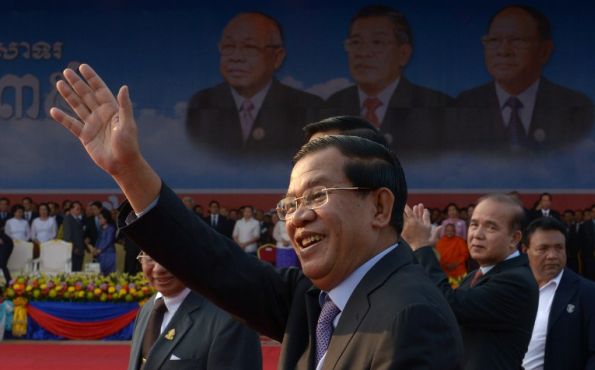[Hun Sen] had nothing to say about what was going on in the present-tense society, which he has ruled now for almost 30 years. In particular he made no mention of his brutal crackdown on dissent, the one that killed five people, injured another 20
The future of democracy in Cambodia
Trying hard to smile
 |
| Hun Sen (Photo: AFP) |
ACROSS Cambodia everyone still loyal to Hun Sen, the prime
minister, was putting on a brave face. This was, after all, a time for
cross-border backslapping marking the 35th anniversary of the Vietnamese invasion that drove out Pol Pot and his Khmer Rouge and installed a new government—the same one that rules today.
Ordinary
Cambodians however were locked out of the display of allegiance, which
was carefully stage-managed by the ruling Cambodian People’s Party (CPP)
near the banks of the Mekong river.
More than 20,000 school
children, senior military officials and hand-picked members of the party
faithful applauded on cue as Heng Samrin, an elder of the CPP, spoke of
the harmonious and vibrant society that emerged from the decades of
war, back in 1979. Mr Hun Sen smiled and waved.
The three strains of dissent were all galvanising into a single force.
Rallies of more than 60,000 to 70,000 people were becoming common, with
the unions pushing to double the minimum wage ($80 from a month to
$160) as the CNRP continued to demand Mr Hun Sen’s resignation. They
regard him guilty of cheating in the election of July 2013.
Like
Mr Hun Sen himself, most of the local media championed the Vietnamese
victory from decades ago and ignored the suppression of Cambodians
today. Footage shot by protesters and some journalists, however, went
viral on social media.
Even in the remotest provinces villagers
were able to watch images of the violence that had been brought to bear
against the striking garment workers. In addition to those killed and
wounded, at least another 28 have been detained and many more went into hiding after plainclothes thugs smashed their way through Freedom Park, a zone in the heart of the capital where demonstrators had established a semi-permanent base.
Two
leaders of the CNRP, Sam Rainsy and Kem Sokha, have been summoned to
appear in court. General repression orders have been extended. Public
gatherings of 10 people or more have been banned, universities have told
students not to hold political rallies or even “sensitive political
discussion”. The army and police in riot gear carry automatic weapons on
routine patrols of the streets.
After two decades of oversight by the United Nations,
and more than $100 billion of foreign aid, the future of Cambodia’s
democracy is now looking bleak. Some members of the CPP are saying that
the practice of democracy itself is being suspended until the next
election, due in 2018.
The economy is teetering too. Foreign
garment-makers like Levi-Strauss, Puma and Gap are among the brands who
are reviewing their options in the aftermath of the violence against
Cambodia’s workers. Combined, these firms spent more than $5 billion on Cambodian-made garments in the past year. Revenues earned accounted for a third of the government’s annual budget.
Though
their street protests have been called off, the workers remain on
strike. Mr Sam Rainsy is avoiding his summons and vowing to splinter the
anti-government forces into smaller groups, spreading them out into the countryside, where they would be harder to detect and suppress.
That
will not please Mr Hun Sen. His distaste for any form of dissent is
well-documented. Indeed it partly explains the dwindling away of his
popularity, which was put on view for all to see in the dramatic drop in
the number of seats his party won (or claimed to win )in July.
The
prime minister’s actions over the past week are not likely to win him
any new friends, though he evidently stands in need. Even smiling faces
will be rare, whenever he’s not attending formal events designed to tout
the glories of his party’s past.


No comments:
Post a Comment